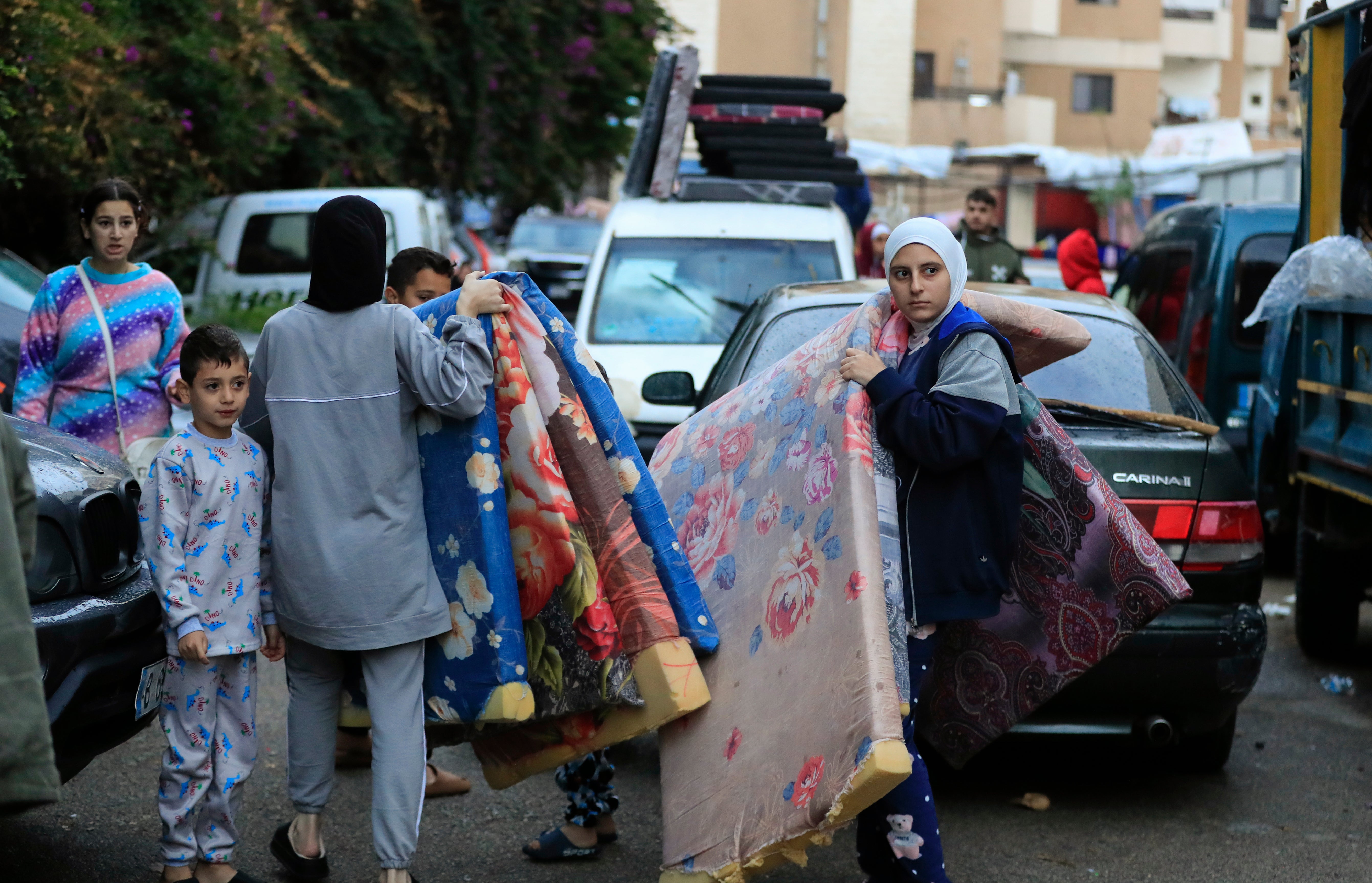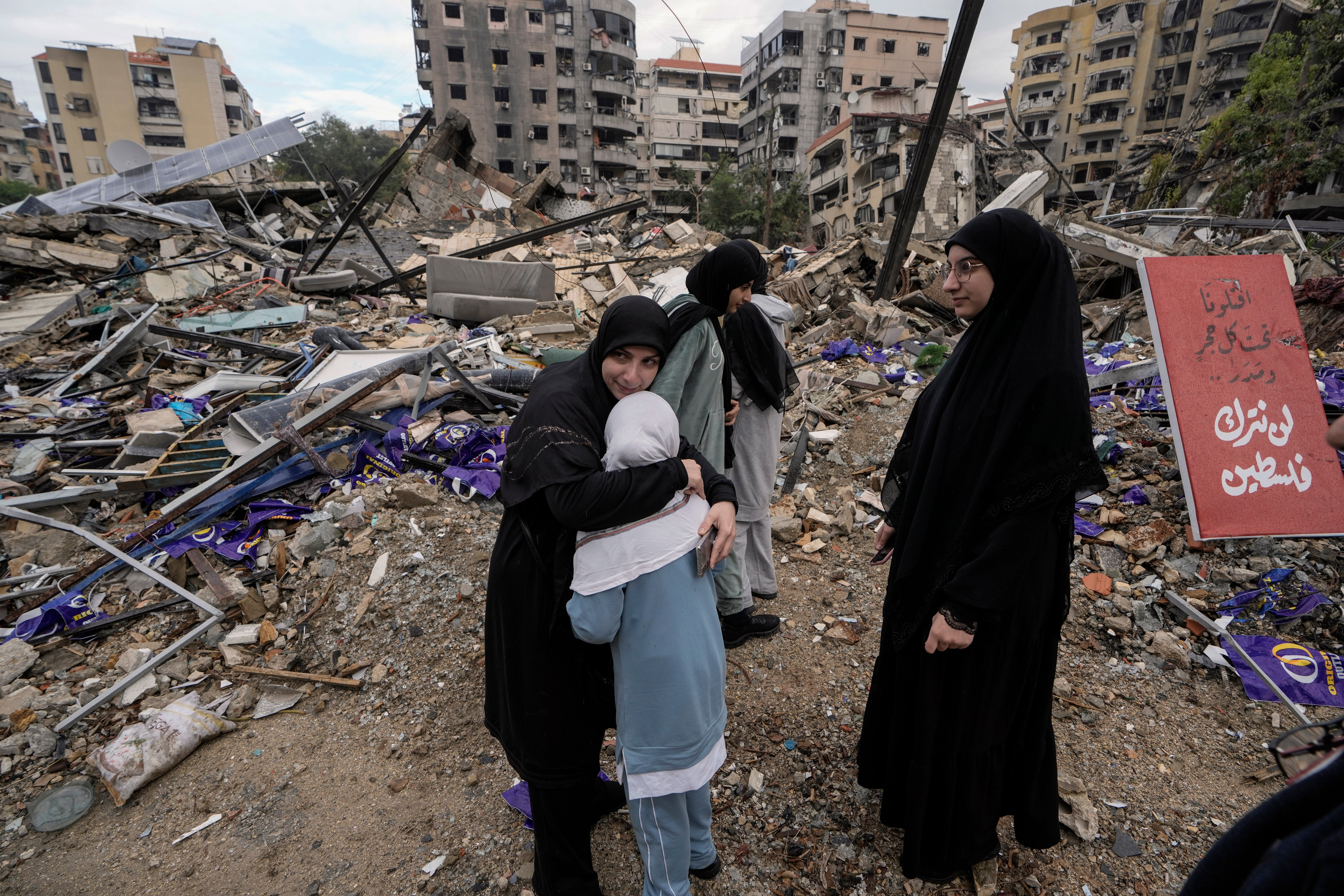Thousands of people forced to leave their homes in war-torn southern Lebanon have started to return in the wake of a ceasefire between Israel and Hezbollah.
Cars and vans piled high with mattresses, suitcases and furniture streamed through the heavily-bombed southern port city of Tyre, heading south where hundreds of thousands of people had been forced to flee nearly 14 months of clashes. Traffic jams could seen around Beirut and along roads heading south, as people set out as soon as the ceasefire came into effect at 4am local time.
Hussein, 45, told The Independent that that he and his wife Hiam, 41 packed all their belongings at the shelter that had been staying in in the Hamra neighbourhood of Beirut, and started the normally two-hour journey to the in a area south of he city of Tyre.
“At 6 o’clock I was turning the car [around] and went straight to Tyre Harfa. I thought I would be the first one there, but I was surprised that the traffic was stifling on the southern road, just like it was when we left for Beirut,”
Hussein said he worked as a painter in and around Tyre, but that dried up about seven months ago, and he fled with his mother, three children and wife as the fighting intensified in Tyre. “Our house is badly damaged, but I will return even if I have to set up a tent in front of the house… the important thing is that the war is over. We are not afraid, we are the owners of the land, but our material losses are great and we have many victims and wounded among the extended family, neighbors and villagers.”
The United Nations secretary-general, Antonio Guterres said a ceasefire was “the first ray of hope” in the regional conflict after months of escalation. “It is essential that those who signed the ceasefire commitment respect it in full,” he said. The truce give some reprieve to the 1.2 million Lebanese displaced by the fighting and the tens of thousands of Israelis who fled their homes along the border.
Under the Lebanon ceasefire terms, Israel will withdraw entirely from southern Lebanon during the 60-day truce, while Hezbollah will move its heavy weaponry north of the Litani River, about 16 miles (25km) north of the border with Israel. The Israeli military cautioned southern Lebanon residents against moving south of the Litani river from 5pm local time to 7am on Thursday, noting that Israeli forces were still present in the area and that it would deal “firmly” with those who continue to travel.

The military also said that Israeli forces fired at several vehicles with what it claimed were “suspects” to prevent them from reaching a no-go zone in Lebanese territory, until the vehicles turned around. Such isolated incidents were not expected to put the ceasefire in danger, but Israeli Chief of the General Staff Herzi Halevi said Israel’s enforcement of the ceasefire would be very determined.
“Hezbollah operatives who approach our troops, the border area, and the villages within the area we have marked will be struck … we are preparing, getting ready for the possibility that this [ceasefire] approach won’t succeed,” he said.
The Lebanese health ministry says nearly 3,800 people have been killed in Lebanon since fighting erupted in the wake of Israel’s retaliatory war against Hamas – an ally of Hezbollah, which is also backed by Iran – in Gaza. The vast majority of deaths have come in the wake of the intensified bombing and ground campaign by Israel that began in September. At least 73 Israeli soldiers have been killed in northern Israel, in the Golan Heights, and in combat in southern Lebanon, according to Israeli authorities.
Majida Mubarak, 60, cried in front of the rubble of her home in the Sfeir area in Beirut’s southern suburbs, which was destroyed during heavy airstrikes by Israel on southern Beirut and other cities just before the ceasefire come into effect. The Israeli military said 330 Hezbollah targets had been struck before the ceasefire came into force. “I don’t feel happy. I don’t have a home to go back to. People are happy because they will be returning to the homes they miss, but we don’t have a home now.” Her husband, Shafiq, 70, a clothing salesman, said: “I spent my whole life building a house in Beirut and a house in my village, Aita al-Shaab,” near the Israeli border. “I built a palace from my tears and sweat.”
“[But] thank God we are fine and our children and our large family are fine. This is the most important thing,” the pair added.

Ghenwa, 55, owns a clothing store in her village in Shamshtar in Baalbek, eastern Lebanon. The conflict had forced her to leave her home for the first time and she was clear of the toll it had taken, even if many were celebrating being able to go home. “The country is almost destroyed and dozens of our relatives were killed or wounded in the war. We are sad about the loss of so many lives, all of them innocent children, women and young people.”
In Israel, the mood was generally subdued, with displaced Israelis concerned that the deal did not go far enough to rein in Hezbollah and that it did not address Gaza and the hostages still held there.
“I think it is still not safe to return to our homes because Hezbollah is still close to us,” said Eliyahu Maman, an Israeli displaced from the northern Israeli city of Kiryat Shmona, which is not far from the border with Lebanon and was hit hard by the months of fighting.
Both the war inside Gaza and the Hezbollah-Isaraeli cross-border fire was triggered on 7 October last year, when Hamas launched an attack inside Israel. They killed around 1,200 people, mostly civilians, and took some 250 hostages into Gaza.
In response, Israel launched a devastating air and ground offensive against Hamas, and Israeli prime minister Benjjamin Netanyahu has vowed to keep fighting until all hostages are freed. Some 100 hostages remain, although about a third of those are believed to be dead. More than 44,000 Palestinians have been killed in the largely devastated Gaza, according to local health officials, while around 90 per cent of the population of around 2.3 million have been forced from their homes.
The deal does not address the war in Gaza, where Israeli strikes overnight on two schools-turned-shelters in Gaza City killed 11 people, including four children, according to hospital officials.
President Joe Biden has said the US will make another push with regional powers for a ceasefire in Gaza, involving the release of hostages and the removal of Hamas from power. “Over the coming days, the United States will make another push with Turkey, Egypt, Qatar, Israel, and others to achieve a ceasefire in Gaza with the hostages released and an end to the war without Hamas in power,” Mr Biden said on X.
Many Gaza residents have said they feel abandoned, with the focus so heavily on Lebanon. “We hope that all Arab and Western countries, and all people with merciful hearts and consciences…implement a truce here because we are tired,” displaced Gazan Malak Abu Laila told Reuters.
Back in Lebanon, many are unsure what the future holds. Fatima, 33, said she and her family were “displaced about four times, once from the south to Tyre, then to the [Beirut] suburbs, then to a school in Sanayeh in Beirut”. Fatima’s husband made clear their ordeal wasn’t over. “Who will rebuild all these villages and all these buildings? Who will restore our memories? Who will buy us furniture?” he asked.

